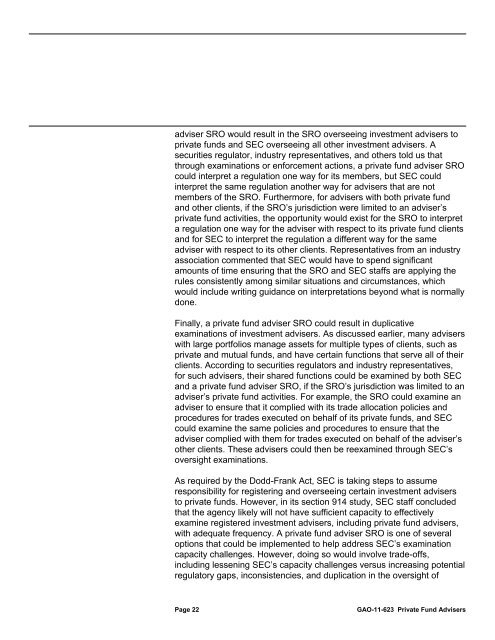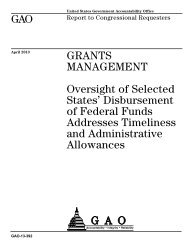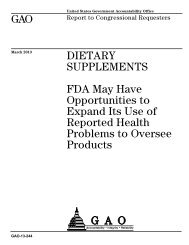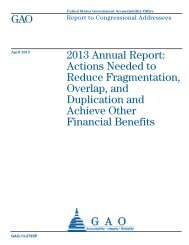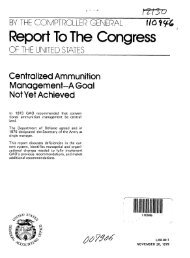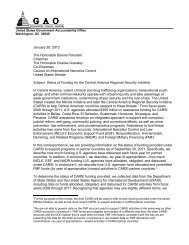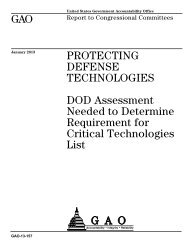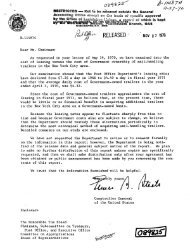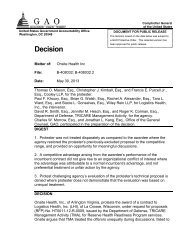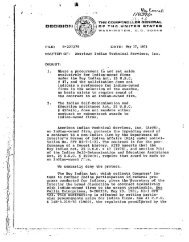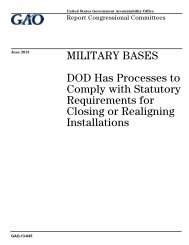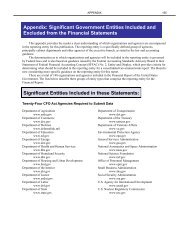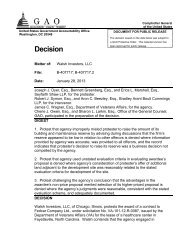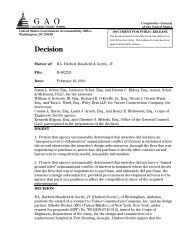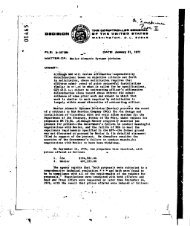GAO-11-623 Private Fund Advisers: Although a Self-Regulatory ...
GAO-11-623 Private Fund Advisers: Although a Self-Regulatory ...
GAO-11-623 Private Fund Advisers: Although a Self-Regulatory ...
You also want an ePaper? Increase the reach of your titles
YUMPU automatically turns print PDFs into web optimized ePapers that Google loves.
adviser SRO would result in the SRO overseeing investment advisers to<br />
private funds and SEC overseeing all other investment advisers. A<br />
securities regulator, industry representatives, and others told us that<br />
through examinations or enforcement actions, a private fund adviser SRO<br />
could interpret a regulation one way for its members, but SEC could<br />
interpret the same regulation another way for advisers that are not<br />
members of the SRO. Furthermore, for advisers with both private fund<br />
and other clients, if the SRO’s jurisdiction were limited to an adviser’s<br />
private fund activities, the opportunity would exist for the SRO to interpret<br />
a regulation one way for the adviser with respect to its private fund clients<br />
and for SEC to interpret the regulation a different way for the same<br />
adviser with respect to its other clients. Representatives from an industry<br />
association commented that SEC would have to spend significant<br />
amounts of time ensuring that the SRO and SEC staffs are applying the<br />
rules consistently among similar situations and circumstances, which<br />
would include writing guidance on interpretations beyond what is normally<br />
done.<br />
Finally, a private fund adviser SRO could result in duplicative<br />
examinations of investment advisers. As discussed earlier, many advisers<br />
with large portfolios manage assets for multiple types of clients, such as<br />
private and mutual funds, and have certain functions that serve all of their<br />
clients. According to securities regulators and industry representatives,<br />
for such advisers, their shared functions could be examined by both SEC<br />
and a private fund adviser SRO, if the SRO’s jurisdiction was limited to an<br />
adviser’s private fund activities. For example, the SRO could examine an<br />
adviser to ensure that it complied with its trade allocation policies and<br />
procedures for trades executed on behalf of its private funds, and SEC<br />
could examine the same policies and procedures to ensure that the<br />
adviser complied with them for trades executed on behalf of the adviser’s<br />
other clients. These advisers could then be reexamined through SEC’s<br />
oversight examinations.<br />
As required by the Dodd-Frank Act, SEC is taking steps to assume<br />
responsibility for registering and overseeing certain investment advisers<br />
to private funds. However, in its section 914 study, SEC staff concluded<br />
that the agency likely will not have sufficient capacity to effectively<br />
examine registered investment advisers, including private fund advisers,<br />
with adequate frequency. A private fund adviser SRO is one of several<br />
options that could be implemented to help address SEC’s examination<br />
capacity challenges. However, doing so would involve trade-offs,<br />
including lessening SEC’s capacity challenges versus increasing potential<br />
regulatory gaps, inconsistencies, and duplication in the oversight of<br />
Page 22<br />
<strong>GAO</strong>-<strong>11</strong>-<strong>623</strong> <strong>Private</strong> <strong>Fund</strong> <strong>Advisers</strong>


